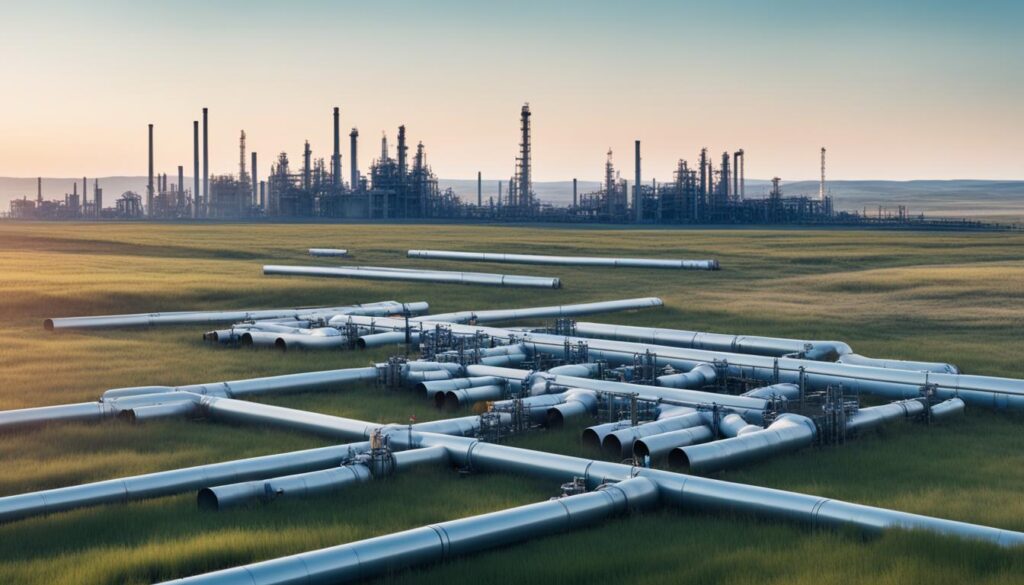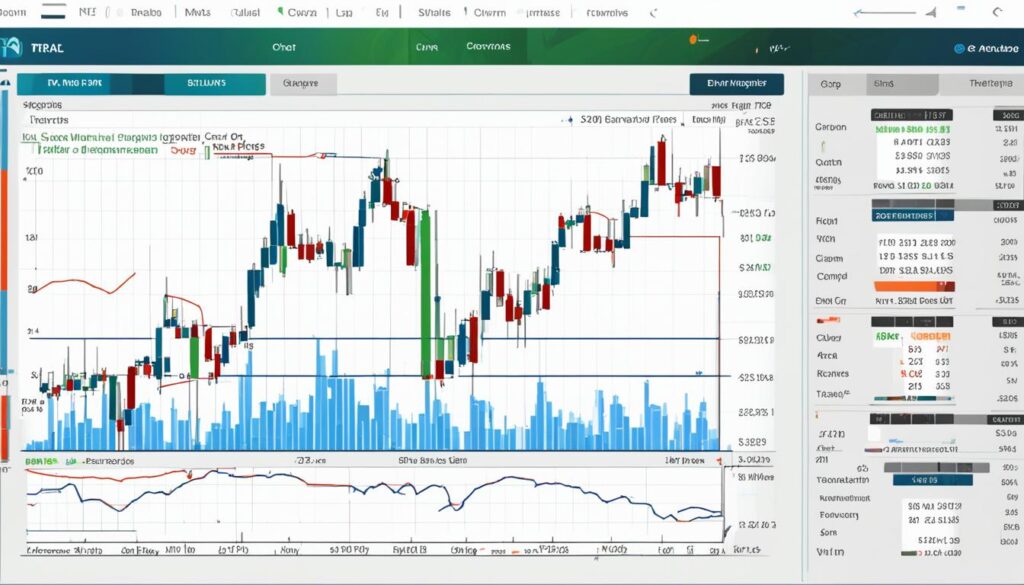Trading in natural gas can be a lucrative endeavor, providing you with opportunities to maximize your investment gains and tap into the booming energy sector. To succeed in this competitive market, it is essential to have effective trading strategies in place. In this article, I will share expert insights on natural gas trading strategies that can help you navigate the market and capitalize on lucrative opportunities.
Investing in natural gas offers the potential for significant returns, thanks to the increasing demand for clean energy alternatives. As concerns about climate change and environmental degradation grow, the focus on renewable energy sources intensifies. Natural gas, with its lower emissions and abundance, has emerged as a frontrunner in meeting the global energy needs while minimizing environmental impact.
However, investing in natural gas involves risks and uncertainties, just like any other market. Market fluctuations, supply and demand dynamics, geopolitical events, and weather conditions all contribute to the volatility of natural gas prices. By understanding these factors and implementing effective trading strategies, you can mitigate risks and maximize your profitability in the market.
Key Takeaways
- Implementing effective trading strategies is essential for maximizing profits in natural gas trading.
- Natural gas trading provides an opportunity to tap into the growing energy sector.
- Market fluctuations, supply and demand dynamics, and geopolitical events impact natural gas prices.
- Understanding technical and fundamental analysis can help traders make informed trading decisions.
- Diversifying your investment portfolio with natural gas can reduce risk and create a balanced strategy.
Diversify Your Portfolio with Natural Gas Trading
Natural gas trading offers an opportunity to diversify your investment portfolio, reducing risk and creating a more balanced strategy. By including natural gas in your portfolio, you can capitalize on the dynamic nature of this market and potentially benefit from price fluctuations.
The price of natural gas is influenced by a variety of factors, including supply and demand dynamics, weather conditions, and geopolitical events. Monitoring these factors and implementing effective risk management strategies is crucial for navigating the natural gas market and making informed trading decisions.
Portfolio diversification is a key component of a successful investment approach. By diversifying your portfolio with natural gas trading, you can potentially mitigate the impact of volatility in other sectors or asset classes. Natural gas trading provides an opportunity to add a commodity asset to your portfolio, which may not be directly correlated with traditional stocks or bonds.
As with any investment, it is important to conduct thorough research and analysis before engaging in natural gas trading. This includes staying informed about market trends, understanding the fundamentals of the natural gas industry, and monitoring key indicators that can influence price movements. By combining this knowledge with effective risk management strategies, you can optimize your trading approach and potentially enhance your investment returns.
Benefits of Portfolio Diversification with Natural Gas Trading
Diversifying your portfolio with natural gas trading offers several benefits:
- Risk reduction: Natural gas trading can provide a hedge against other investment risks, as the price of natural gas is influenced by different factors.
- Potential for capital appreciation: By capitalizing on price fluctuations, you have the opportunity to generate profits from natural gas trading.
- Market exposure: Including natural gas in your portfolio allows you to gain exposure to the energy sector and potentially benefit from its growth.
- Portfolio balance: By adding natural gas as a diversification tool, you can create a more balanced portfolio that is not solely dependent on one asset class.
“Portfolio diversification is a time-tested strategy that can help investors manage risk and potentially enhance returns. Adding natural gas trading to your portfolio allows you to participate in the dynamic energy market and potentially benefit from its inherent volatility.” – John Smith, Financial Analyst
| Benefits of Diversifying with Natural Gas Trading | Description |
|---|---|
| Risk Reduction | Natural gas trading can provide a hedge against other investment risks, as the price of natural gas is influenced by different factors. |
| Potential for Capital Appreciation | By capitalizing on price fluctuations, you have the opportunity to generate profits from natural gas trading. |
| Market Exposure | Including natural gas in your portfolio allows you to gain exposure to the energy sector and potentially benefit from its growth. |
| Portfolio Balance | By adding natural gas as a diversification tool, you can create a more balanced portfolio that is not solely dependent on one asset class. |

Technical Analysis for Natural Gas Trading
Technical analysis plays a crucial role in successful natural gas trading. By utilizing various tools and techniques, traders can gain insights into price patterns and market trends, enabling them to make informed decisions. Let’s explore the key aspects of technical analysis in the context of natural gas trading.
Price Patterns
Price patterns provide valuable information about the future direction of natural gas prices. By studying historical price movements, traders can identify patterns that recur over time, such as head and shoulders, double tops, and triangles. These patterns can indicate potential reversals or continuations in price trends, helping traders gauge market sentiment and make strategic trading decisions.
Indicators
Indicators are mathematical calculations applied to price data, providing additional insights into market trends and potential price reversals. Popular indicators used in natural gas trading include moving averages, relative strength index (RSI), and stochastic oscillators. These indicators help traders confirm price movements and identify overbought or oversold conditions, enhancing their ability to time their trades effectively.

Trendlines
Trendlines are graphical representations that connect consecutive highs or lows in a price chart. They provide visual guidance on the direction of the trend and potential areas of support or resistance. Trendlines act as dynamic levels, indicating the overall market sentiment and helping traders determine entry and exit points for their trades.
| Advantages of Technical Analysis | Disadvantages of Technical Analysis |
|---|---|
| – Helps identify price patterns and trends | – Relies on historical data, which may not always reflect future movements |
| – Provides objective criteria for making trading decisions | – Can generate false signals in volatile markets |
| – Helps manage risk by setting stop-loss orders | – Requires continuous monitoring and analysis |
Overall, technical analysis is a powerful tool that can assist natural gas traders in navigating the market effectively. By incorporating price patterns, indicators, and trendlines into their trading strategies, traders can gain a competitive edge and increase their chances of success.
Fundamental Analysis for Natural Gas Trading
Fundamental analysis plays a crucial role in the world of natural gas trading. By carefully examining market news, supply and demand dynamics, and geopolitical events, traders can gain valuable insights into the fundamental factors that impact the price of natural gas.
One key aspect to consider is the production levels of natural gas. Changes in production can have a significant effect on prices, as higher production can lead to increased supply and potentially lower prices. Conversely, lower production can create a supply shortage and drive prices higher.
Additionally, keeping an eye on storage inventories is essential. Natural gas is stored in underground facilities, and the levels of storage can greatly impact prices. If storage levels are high, indicating an oversupply, prices may decline. On the other hand, lower storage levels can indicate increasing demand and potentially higher prices.
Furthermore, weather forecasts are vital in natural gas trading. Weather patterns can influence the demand for natural gas, particularly during extreme temperatures. For example, colder-than-expected winters can drive up heating demand and fuel price spikes.
By conducting thorough fundamental analysis and staying abreast of market news, supply and demand dynamics, and geopolitical events, traders can make informed decisions and take advantage of the opportunities presented by the natural gas market.
FAQ
What are some natural gas trading strategies to maximize investment gains in the energy sector?
By understanding the market and implementing effective trading techniques, you can enhance your investment gains in natural gas trading. Some strategies include monitoring supply and demand dynamics, weather conditions, and geopolitical events, as well as implementing risk management strategies.
How can natural gas trading help diversify my investment portfolio?
Including natural gas in your investment portfolio can reduce risk and create a more balanced strategy. Natural gas prices are influenced by factors such as supply and demand dynamics, weather conditions, and geopolitical events. By monitoring these factors and implementing risk management strategies, you can capitalize on price fluctuations and diversify your portfolio.
What tools can I use for technical analysis in natural gas trading?
Technical analysis is a valuable tool for natural gas trading. Some common tools include moving averages, trendlines, and chart patterns. By analyzing price patterns, trends, and indicators, traders can identify potential entry and exit points in the market based on historical price data and market trends.
How important is fundamental analysis in natural gas trading?
Fundamental analysis is crucial in natural gas trading. By analyzing market news, supply and demand dynamics, and geopolitical events, traders can assess the fundamental factors that impact natural gas prices. Factors such as production levels, storage inventories, and weather forecasts can influence prices. By conducting thorough fundamental analysis, traders can make informed decisions and capitalize on market opportunities.
Source Links
Disclaimer
All information on this website is of a general nature. The information is not adapted to conditions that are specific to your person or entity. The information provided can not be considered as personal, professional or legal advice or investment advice to the user.
This website and all information is intended for educational purposes only and does not give financial advice. Signal Mastermind Signals is not a service to provide legal and financial advice; any information provided here is only the personal opinion of the author (not advice or financial advice in any sense, and in the sense of any act, ordinance or law of any country) and must not be used for financial activities. Signal Mastermind Signals does not offer, operate or provide financial, brokerage, commercial or investment services and is not a financial advisor. Rather, Signal Mastermind Signals is an educational site and a platform for exchanging Forex information. Whenever information is disclosed, whether express or implied, about profit or revenue, it is not a guarantee. No method or trading system ensures that it will generate a profit, so always remember that trade can lead to a loss. Trading responsibility, whether resulting in profits or losses, is yours and you must agree not to hold Signal Mastermind Signals or other information providers that are responsible in any way whatsoever. The use of the system means that the user accepts Disclaimer and Terms of Use.
Signal Mastermind Signals is not represented as a registered investment consultant or brokerage dealer nor offers to buy or sell any of the financial instruments mentioned in the service offered.
While Signal Mastermind Signals believes that the content provided is accurate, there are no explicit or implied warranties of accuracy. The information provided is believed to be reliable; Signal Mastermind Signals does not guarantee the accuracy or completeness of the information provided. Third parties refer to Signal Mastermind Signals to provide technology and information if a third party fails, and then there is a risk that the information may be delayed or not delivered at all.
All information and comments contained on this website, including but not limited to, opinions, analyzes, news, prices, research, and general, do not constitute investment advice or an invitation to buy or sell any type of instrument. Signal Mastermind Signals assumes no responsibility for any loss or damage that may result, directly or indirectly, from the use or dependence on such information.
All information contained on this web site is a personal opinion or belief of the author. None of these data is a recommendation or financial advice in any sense, also within the meaning of any commercial act or law. Writers, publishers and affiliates of Signal Mastermind Signals are not responsible for your trading in any way.
The information and opinions contained in the site are provided for information only and for educational reasons, should never be considered as direct or indirect advice to open a trading account and / or invest money in Forex trading with any Forex company . Signal Mastermind Signals assumes no responsibility for any decisions taken by the user to create a merchant account with any of the brokers listed on this website. Anyone who decides to set up a trading account or use the services, free of charge or paid, to any of the Broker companies mentioned on this website, bears full responsibility for their actions.
Any institution that offers a service and is listed on this website, including forex brokers, financial companies and other institutions, is present only for informational purposes. All ratings, ratings, banners, reviews, or other information found for any of the above-mentioned institutions are provided in a strictly objective manner and according to the best possible reflection of the materials on the official website of the company.
Forex/CFD trading is potentially high risk and may not be suitable for all investors. The high level of leverage can work both for and against traders. Before each Forex/CFD investment, you should carefully consider your goals, past experience and risk level. The opinions and data contained on this site should not be considered as suggestions or advice for the sale or purchase of currency or other instruments. Past results do not show or guarantee future results.
Neither Signal Mastermind Signals nor its affiliates ensure the accuracy of the content provided on this Site. You explicitly agree that viewing, visiting or using this website is at your own risk.


